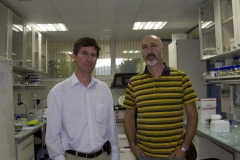
2012/10/01
Metabolomics and proteomics, two key technologies in modern biology
- International experts will discuss recent technological advances and the applications of these techniques in a conference entitled "Metabolomics & Proteomics. Technology and Applications" to be held in Derio (1-3 October).
- These disciplines are applied in fields ranging from new drug development to biomarker identification and environmental pollutant detection.
(Bilbao, 1 October 2012).- CIC bioGUNE is shortly to host a conference that will discuss the latest progress in two essential technologies in modern biology, namely metabolomics and proteomics. Over three days (1-3 October), international experts in these fields, which have probably had the greatest impact over the past few years on our understanding of biological systems, will gather under the auspices of the Second International Metabolomics and Proteomics Workshop entitled "Technology and Applications"
The meeting will be held at the site of the Center for Cooperative Research in Biosciences CIC bioGUNE at the Bizkaia Technology Park in Derio and will cover the latest progress in the field of single-cell, high-throughout metabolomics, large-scale protein characterisation or quantification, and the potential applications of these technologies in fields such as pesticide detection in food, novel drug development and biomarker identification.
Metabolomics and proteomics are currently considered to be two key disciplines in the field of systems biology as they allow aspects such as the functioning of organs and living beings to be studied in great detail.
Metabolomics
Metabolomics is the study of metabolites, in other words molecules with a very low molecular mass that are produced during metabolism, including amino acids, sugars or lipids. Metabolism is the term used to describe all the physical and chemical processes in an organism that produce the energy and biomolecules required for life.
"Identifying metabolites helps us to understand how the metabolism in an organ or living being works. This technique will therefore help us to study complex biological processes, the efficacy and toxicity of new drugs or the mechanism by which a disease progresses", states Dr. Juan Falcón, an Ikerbasque researcher at CIC bioGUNE and one of the conference coordinators.
In this edition, Dr. Christoph Borchers, from the University of Vancouver (Canada), will describe the latest progress of our understanding of how our intestinal flora works using metabolomics. Similarly, Dr. Karsten Hiller, from the Biomedical Research Centre in Luxembourg, will present the findings that have allowed his group to characterise a new defence mechanisms in cells that helps them to dispose of the toxic agents produced during metabolism.
The talk by Dr. Rick Dunn, from the University of Manchester, who will present the most recent methodological advances in the study of biological samples of great interest for the diagnosis of metabolic diseases, is also one of the highlights.
Proteomics
Proteomics is the study of the set of proteins expressed by a cell, tissue or organism. As proteins are produced by genes, the sequencing of an organism's genome should allow us to analyse the pattern of numerous proteins simultaneously. "Changes in expression between healthy and diseased samples will allow us to gain a better understanding of the molecular mechanisms of the disease", notes Dr. Félix Elortza, a researcher at CIC bioGUNE and conference coordinator. "Experiments of this type allow us to lay the foundations for detecting new drugs as the majority of drugs used today target a protein", he adds.
The most important speakers in this field include Prof. Richard Simpson, from the Trobe Institute for Molecular Science, (Victoria, Australia), who will discuss the characterisation of exosomes secreted by colon cancer cells, and Dr. Corrales, from CIMA in Pamplona, who will present the latest findings of his proteomics-based study of liver diseases. The presentation by Dr. Juan Pablo Albar, who will describe the Spanish contribution to the detection of all proteins encoded by chromosome 16, an initiative that forms part of the Human Proteome Project (HUPO), in which CIC bioGUNE's proteomics platform is also involved, is also worthy of mention.
See a large version of the first picture





